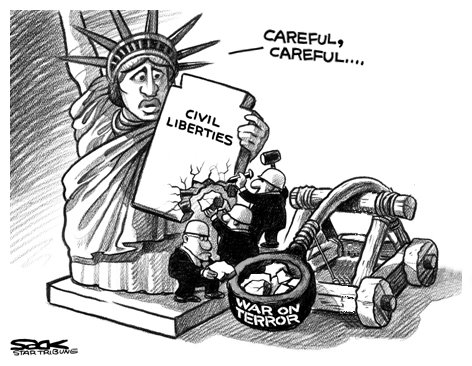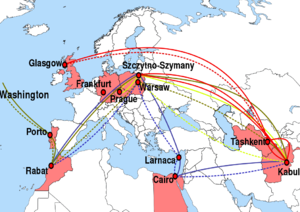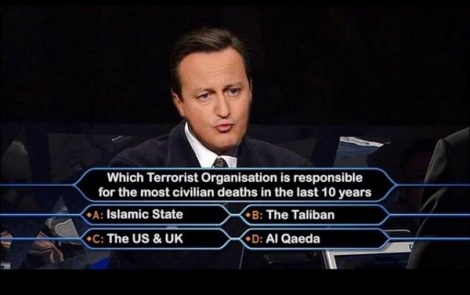Difference between revisions of "War on Terror/Purposes"
m (t) |
|||
| Line 8: | Line 8: | ||
The '''purposes of the "[[war on terror]]"''' (like those of the "[[war on drugs]]") are concealed behind a hypocritical {{on}}. This article examines the ''real'' purposes behind the hyperbole. | The '''purposes of the "[[war on terror]]"''' (like those of the "[[war on drugs]]") are concealed behind a hypocritical {{on}}. This article examines the ''real'' purposes behind the hyperbole. | ||
| − | ==Official narrative | + | ==Official narrative== |
| − | + | It's all about keeping citizens safe by deterring "[[terrorists]]" from future attacks and foiling their [[wicked]] schemes. | |
==Alternative Purposes== | ==Alternative Purposes== | ||
Revision as of 09:58, 30 June 2017
 | |
| The purposes of the "War On Terror" were actually not much asked about in the immediate aftermath of 9-11. If the criterion by which is should be measured is a reduction in "terrorism", the policy has been singularly unsuccessful. However, the reality behind it is by no means as one dimensional as the commercially-controlled media would suggest... |
The purposes of the "war on terror" (like those of the "war on drugs") are concealed behind a hypocritical official narrative. This article examines the real purposes behind the hyperbole.
Official narrative
It's all about keeping citizens safe by deterring "terrorists" from future attacks and foiling their wicked schemes.
Alternative Purposes
Another perspective notes firstly that traffic accidents kill hundreds of times more people than "terrorists", to say nothing of cancer or other such indirect fallout from domination project. It considers the multiplicity of evidence that the largest and most spectacular attacks (such as 9/11 or 9/99) are in reality false flag attacks, and the fact that NATO is known to have staged such attacks in the past, or that CIA connected spooks sold bomb-making equipment & training on a massive scale to Libya. This perspective suggests that the "war on terror" is a subterfuge used to introduce a totalitarian police state.
Increasing censorship
- Full article: Censorship
- Full article: Censorship
Governments involved in the "war on terror" are increasingly seeking to censor information rather than trying to explain the serious discrepancies between the official narrative and the observable (and now, with modern communication technology, also easily broadcastable) real world. For example, the UK government, is seeking to ban web content that - although legal - it deems to be "unsavoury".[1] In USA, FOIA requests have become become more or less useless due to exemptions made for "national security".
Rolling back Civil Liberties
- Full article: Civil liberties
- Full article: Civil liberties
The "war on terror" serves as a pretext for rolling back civil liberties[2] including habeus corpus, the freedom from unlawful search and seizure or the absolute ban on torture. Western governments have repeatedly drafted legislation in vague legal terms, presenting it in the context of Islamic terrorism and once it is passed, then applying it to so-called "domestic terrorists", abusing the deliberately plastic nature of the concept.
Mass surveillance
- Full article:
 Mass surveillance
Mass surveillance
- Full article:
After the Edward Snowden Affair, widespread mass surveillance by the NSA and other government agencies is now widely known to have been carried out illegally for years. There is no serious discussion in the commercially-controlled media of legal proceedings against the perpetrators, and the discussion is framed in the context of the "war on terror".
Forced disappearance
- Full article: Forced disappearance
- Full article: Forced disappearance
In contravention of international human rights law, many national governments have been engaging in (and even attempting to legalize) the forced disappearance of their own citizens, or other other "terrorist suspects" within (or particularly in the case of the US also outside) their borders. A variety of legal tactics are employed to muddy the waters, and the commercially-controlled media is generally complicit in its failure to clearly report such cases.
Extraordinary rendition
- Full article: “Extraordinary rendition”
- Full article: “Extraordinary rendition”
In fact far from extraordinary, what the commercially-controlled media refer to as "extraordinary rendition" is used increasingly commonly under the "War on Terror" rhetoric. It is basically the forced deportation of a victim from one legal jurisdiction into another, e.g. to circumvent legal obstacles to their torture.
Torture
- Full article:
 Torture
Torture
- Full article:
The commercially-controlled media have repeatedly invoked the bogus 'ticking time bomb' scenario in an apparent effort to promote public acceptance of the re-legalisation of torture, irrespective of the unreasonableness of this situation. The fact that torture has other purposes (such as the creation of bogus intelligence and the terrorisation of subject populations) is seldom if ever mentioned by big media. in 2014 US President Barack Obama casually admitted "We tortured some folks", but did not go on to make the (legally obvious) point that this meant crimes had been broken and that people would be charged as a result.
Indefinite detention
- Full article: Indefinite detention
- Full article: Indefinite detention
Indefinite detention, in many countries more or less agreed to be unthinkable in the 20th century, is increasingly being used in the 21st century, particularly against "illegal immigrants" as well as "suspected terrorists". Canada was ahead of the curve in passing a 1978 law to explicitly permits it, while Australia did so in 1994 and the UK passed legislation to the same effect in 2006. In USA the 2012 NDAA authorised this - a law that was challenged by Chris Hedges but deemed legal by the US Supreme Court in April 2014.
Secret trials
- Full article: Secret trial
- Full article: Secret trial
In 2008 the UK's Crown Prosecution Service began claiming that for nebulous reasons of "national security", some trials would have to be held partly in secret. In 2014, the claim was expanded to state that completely secret trials were needed. This was not allowed on appeal, but nevertheless, the number of secret trials is increasing and the trend seems pretty clear.
Assassination
- Full article:
 Assassination
Assassination
- Full article:
Rebranded "targeted killing" just as torture was rebranded "extreme interrogation", regimes such as US under President Obama have claimed, since their murder of Anwar al-Awlaki came to light, that they have the legal right to kill anyone they deem as a "terrorist" suspect, with no judicial process needed.
"Banning Cash"
The French Finance Minister Michel Sapin claimed in 2015 that it was necessary to "fight against the use of cash and anonymity in the French economy" since this facilitated terrorism. He planned to ban French residents from making cash payments of over €1,000 (€10,000 for tourists). This is just one of a range of restrictions which have lead several commentators to suggest that these are first steps towards "banning cash". Spain has banned cash transactions of over €2,500 and Italy has a limit of €1,000.[4][5][6] The governments of several countries, including Denmark and Australia have declared their intention to ban cash.
Financial gain
As top level deep politicians, the organisers of the War on Terror are not short of money making schemes[7] so to suggest that they are motivated by financial gain would be incorrect. However, they need help in realising the plan, and it is no coincidence that it has been a boon to the burgeoning "anti-terrorism" industry. The vast majority of those actively engaged in it, from ground level operatives through to CEOs and institutional investors are probably highly motivated by a short term financial self-interest. Promoting "terrorism" and fear of it is a multi-billion dollar business opportunity both inside government[8] and out.[9]
Cover for future crimes
The presence of fictional terrorists facilitates crimes such as bombings to kill people or destroy embarrassing evidence, such as the evidence concerning Whitewater which vanished after the OKC bombing, or the financial investigations which were abandoned after 9/11.
Related Documents
| Title | Type | Publication date | Author(s) | Description |
|---|---|---|---|---|
| Document:Fleeced by Purveyors of Fear | article | 1 October 2010 | Simon Jenkins | |
| Document:The use of terrorism to construct world order | paper | 10 September 2004 | Ola Tunander | |
| Document:This war on terrorism is bogus | article | 6 September 2003 | Michael Meacher | |
| Document:Unlayering the Middle East War Agenda | article | 21 January 2011 | Zahir Ebrahim | |
| File:The Use of Terrorism to Construct World Order.pdf | paper | 9 September 2004 | Ola Tunander | A Paper presented at the Fifth Pan-European International Relations Conference (Panel 28 Geopolitics) Netherlands Congress Centre, The Hague. |
Rating
Many people are of course making money from the "war on terror", but as this page details, those who created it had deeper plans, such as the removal of civil liberties, increasing of censorship and mass surveillance
References
- ↑ http://www.wired.co.uk/news/archive/2014-03/15/government-web-censorship
- ↑ File:ICJ report 16-2-09.pdf
- ↑ "Politycy nie pozwolili śledczym tropić lotów CIA – Rzeczpospolita". Rzeczpospolita (in (in Polish)). 17 April 2009. Retrieved 17 July 2010.CS1 maint: unrecognized language (link)Page Module:Citation/CS1/styles.css must have content model "Sanitized CSS" for TemplateStyles (current model is "Scribunto").
- ↑ http://www.reuters.com/article/2015/03/18/us-france-security-financing-idUSKBN0ME14720150318
- ↑ http://www.zerohedge.com/news/2015-03-23/fighting-war-terror-banning-cash
- ↑ http://theeconomiccollapseblog.com/archives/they-are-slowly-making-cash-illegal
- ↑ For example, note that deep state groups control the illegal drug trade
- ↑ http://www.theglobeandmail.com/news/politics/ottawa-loses-track-of-31-billion-meant-to-fight-terror/article11629983/
- ↑ http://usatoday30.usatoday.com/money/industries/2006-09-10-security-industry_x.htm


